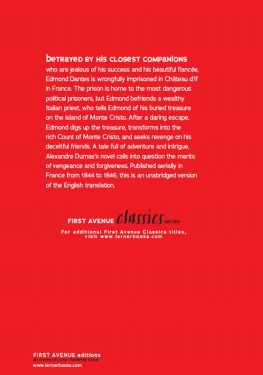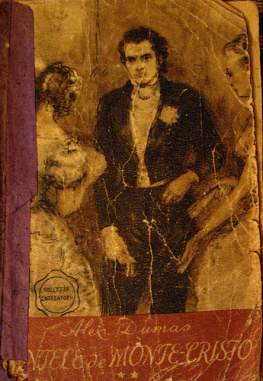Dumas Alexandre - The Count of Monte Cristo
Here you can read online Dumas Alexandre - The Count of Monte Cristo full text of the book (entire story) in english for free. Download pdf and epub, get meaning, cover and reviews about this ebook. publisher: Lerner Publishing Group, genre: Adventure. Description of the work, (preface) as well as reviews are available. Best literature library LitArk.com created for fans of good reading and offers a wide selection of genres:
Romance novel
Science fiction
Adventure
Detective
Science
History
Home and family
Prose
Art
Politics
Computer
Non-fiction
Religion
Business
Children
Humor
Choose a favorite category and find really read worthwhile books. Enjoy immersion in the world of imagination, feel the emotions of the characters or learn something new for yourself, make an fascinating discovery.
- Book:The Count of Monte Cristo
- Author:
- Publisher:Lerner Publishing Group
- Genre:
- Rating:3 / 5
- Favourites:Add to favourites
- Your mark:
- 60
- 1
- 2
- 3
- 4
- 5
The Count of Monte Cristo: summary, description and annotation
We offer to read an annotation, description, summary or preface (depends on what the author of the book "The Count of Monte Cristo" wrote himself). If you haven't found the necessary information about the book — write in the comments, we will try to find it.
The Count of Monte Cristo — read online for free the complete book (whole text) full work
Below is the text of the book, divided by pages. System saving the place of the last page read, allows you to conveniently read the book "The Count of Monte Cristo" online for free, without having to search again every time where you left off. Put a bookmark, and you can go to the page where you finished reading at any time.
Font size:
Interval:
Bookmark:


Betrayed by his closest friends, Edmond Dantes lands in prison. There a wealthy priest tells Edmond about a buried treasure. After a daring escape, Edmond digs up the treasure, becomes the Count of Monte Cristo, and seeks revenge on his deceitful friends. The book was first published serially in France from 1844 to 1846; this version is the English translation, and the text is in the public domain. This First Avenue Classics version has placed the text into a new design to make this book appealing and easier to read in both digital and paperback formats. The eBook contains a hyperlinked Table of Contents for navigation. The First Avenue Classics version is unabridged and has been proofed for formatting errors. Errors and alternate spellings found in the original book have not been changed.
Copyright 2014 by Lerner Publishing Group, Inc.
All rights reserved. International copyright secured. No part of this book may be reproduced, stored in a retrieval system, or transmitted in any form or by any meanselectronic, mechanical, photocopying, recording, or otherwisewithout the prior written permission of Lerner Publishing Group, Inc.
First Avenue Editions
A division of Lerner Publishing Group, Inc.
241 First Avenue North
Minneapolis, MN 55401 USA
For reading levels and more information, look up this title at www.lernerbooks.com.
In fixed layout formats of this book, the main body text is set in Janson Text LT Std 55 Roman 11/15. Typeface provided by Adobe Systems.
Library of Congress Cataloging-in-Publication Data
Dumas, Alexandre, 1802-1870.
[Comte de Monte-Cristo. English]
The Count of Monte Cristo / by Alexandre Dumas.
pages cm. (First Avenue classics)
ISBN: 9781467758215 (pbk. : alk. paper)
ISBN: 9781467758222 (eBook)
1. FranceHistory19th centuryFiction. I. Title.
PQ2226.A31 2014
843'.7dc23
2014013987
Manufactured in the United States of America
1 DOC 7/15/14
eISBN: 978-1-4677-5822-2 (pdf)
eISBN: 978-1-4677-7528-1 (ePub)
eISBN: 978-1-4677-7529-8 (mobi)
Chapter 1.
MARSEILLES-THE ARRIVAL.
On the 24th of February, 1815, the look-out at Notre-Dame de la Garde signalled the three-master, the Pharaon from Smyrna, Trieste, and Naples.
As usual, a pilot put off immediately, and rounding the Chateau dIf, got on board the vessel between Cape Morgion and Rion island.
Immediately, and according to custom, the ramparts of Fort Saint-Jean were covered with spectators; it is always an event at Marseilles for a ship to come into port, especially when this ship, like the Pharaon, has been built, rigged, and laden at the old Phocee docks, and belongs to an owner of the city.
The ship drew on and had safely passed the strait, which some volcanic shock has made between the Calasareigne and Jaros islands; had doubled Pomegue, and approached the harbor under topsails, jib, and spanker, but so slowly and sedately that the idlers, with that instinct which is the forerunner of evil, asked one another what misfortune could have happened on board. However, those experienced in navigation saw plainly that if any accident had occurred, it was not to the vessel herself, for she bore down with all the evidence of being skilfully handled, the anchor a-cockbill, the jib-boom guys already eased off, and standing by the side of the pilot, who was steering the Pharaon towards the narrow entrance of the inner port, was a young man, who, with activity and vigilant eye, watched every motion of the ship, and repeated each direction of the pilot.
The vague disquietude which prevailed among the spectators had so much affected one of the crowd that he did not await the arrival of the vessel in harbor, but jumping into a small skiff, desired to be pulled alongside the Pharaon, which he reached as she rounded into La Reserve basin.
When the young man on board saw this person approach, he left his station by the pilot, and, hat in hand, leaned over the ships bulwarks.
He was a fine, tall, slim young fellow of eighteen or twenty, with black eyes, and hair as dark as a ravens wing; and his whole appearance bespoke that calmness and resolution peculiar to men accustomed from their cradle to contend with danger.
Ah, is it you, Dantes? cried the man in the skiff. Whats the matter? and why have you such an air of sadness aboard?
A great misfortune, M. Morrel, replied the young man,a great misfortune, for me especially! Off Civita Vecchia we lost our brave Captain Leclere.
And the cargo? inquired the owner, eagerly.
Is all safe, M. Morrel; and I think you will be satisfied on that head. But poor Captain Leclere
What happened to him? asked the owner, with an air of considerable resignation. What happened to the worthy captain?
He died.
Fell into the sea?
No, sir, he died of brain-fever in dreadful agony. Then turning to the crew, he said, Bear a hand there, to take in sail!
All hands obeyed, and at once the eight or ten seamen who composed the crew, sprang to their respective stations at the spanker brails and outhaul, topsail sheets and halyards, the jib downhaul, and the topsail clewlines and buntlines. The young sailor gave a look to see that his orders were promptly and accurately obeyed, and then turned again to the owner.
And how did this misfortune occur? inquired the latter, resuming the interrupted conversation.
Alas, sir, in the most unexpected manner. After a long talk with the harbor-master, Captain Leclere left Naples greatly disturbed in mind. In twenty-four hours he was attacked by a fever, and died three days afterwards. We performed the usual burial service, and he is at his rest, sewn up in his hammock with a thirty-six pound shot at his head and his heels, off El Giglio island. We bring to his widow his sword and cross of honor. It was worth while, truly, added the young man with a melancholy smile, to make war against the English for ten years, and to die in his bed at last, like everybody else.
Why, you see, Edmond, replied the owner, who appeared more comforted at every moment, we are all mortal, and the old must make way for the young. If not, why, there would be no promotion; and since you assure me that the cargo
Is all safe and sound, M. Morrel, take my word for it; and I advise you not to take 25,000 francs for the profits of the voyage.
Then, as they were just passing the Round Tower, the young man shouted: Stand by there to lower the topsails and jib; brail up the spanker!
The order was executed as promptly as it would have been on board a man-of-war.
Let goand clue up! At this last command all the sails were lowered, and the vessel moved almost imperceptibly onwards.
Now, if you will come on board, M. Morrel, said Dantes, observing the owners impatience, here is your supercargo, M. Danglars, coming out of his cabin, who will furnish you with every particular. As for me, I must look after the anchoring, and dress the ship in mourning.
The owner did not wait for a second invitation. He seized a rope which Dantes flung to him, and with an activity that would have done credit to a sailor, climbed up the side of the ship, while the young man, going to his task, left the conversation to Danglars, who now came towards the owner. He was a man of twenty-five or twenty-six years of age, of unprepossessing countenance, obsequious to his superiors, insolent to his subordinates; and this, in addition to his position as responsible agent on board, which is always obnoxious to the sailors, made him as much disliked by the crew as Edmond Dantes was beloved by them.
Next pageFont size:
Interval:
Bookmark:
Similar books «The Count of Monte Cristo»
Look at similar books to The Count of Monte Cristo. We have selected literature similar in name and meaning in the hope of providing readers with more options to find new, interesting, not yet read works.
Discussion, reviews of the book The Count of Monte Cristo and just readers' own opinions. Leave your comments, write what you think about the work, its meaning or the main characters. Specify what exactly you liked and what you didn't like, and why you think so.





